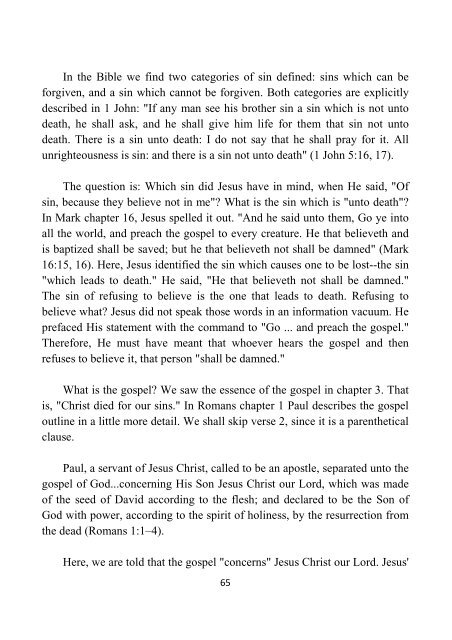Message of the Latter Rain - Kelvin M. Duncan
You also want an ePaper? Increase the reach of your titles
YUMPU automatically turns print PDFs into web optimized ePapers that Google loves.
In <strong>the</strong> Bible we find two categories <strong>of</strong> sin defined: sins which can be<br />
forgiven, and a sin which cannot be forgiven. Both categories are explicitly<br />
described in 1 John: "If any man see his bro<strong>the</strong>r sin a sin which is not unto<br />
death, he shall ask, and he shall give him life for <strong>the</strong>m that sin not unto<br />
death. There is a sin unto death: I do not say that he shall pray for it. All<br />
unrighteousness is sin: and <strong>the</strong>re is a sin not unto death" (1 John 5:16, 17).<br />
The question is: Which sin did Jesus have in mind, when He said, "Of<br />
sin, because <strong>the</strong>y believe not in me"? What is <strong>the</strong> sin which is "unto death"?<br />
In Mark chapter 16, Jesus spelled it out. "And he said unto <strong>the</strong>m, Go ye into<br />
all <strong>the</strong> world, and preach <strong>the</strong> gospel to every creature. He that believeth and<br />
is baptized shall be saved; but he that believeth not shall be damned" (Mark<br />
16:15, 16). Here, Jesus identified <strong>the</strong> sin which causes one to be lost--<strong>the</strong> sin<br />
"which leads to death." He said, "He that believeth not shall be damned."<br />
The sin <strong>of</strong> refusing to believe is <strong>the</strong> one that leads to death. Refusing to<br />
believe what? Jesus did not speak those words in an information vacuum. He<br />
prefaced His statement with <strong>the</strong> command to "Go ... and preach <strong>the</strong> gospel."<br />
Therefore, He must have meant that whoever hears <strong>the</strong> gospel and <strong>the</strong>n<br />
refuses to believe it, that person "shall be damned."<br />
What is <strong>the</strong> gospel? We saw <strong>the</strong> essence <strong>of</strong> <strong>the</strong> gospel in chapter 3. That<br />
is, "Christ died for our sins." In Romans chapter 1 Paul describes <strong>the</strong> gospel<br />
outline in a little more detail. We shall skip verse 2, since it is a paren<strong>the</strong>tical<br />
clause.<br />
Paul, a servant <strong>of</strong> Jesus Christ, called to be an apostle, separated unto <strong>the</strong><br />
gospel <strong>of</strong> God...concerning His Son Jesus Christ our Lord, which was made<br />
<strong>of</strong> <strong>the</strong> seed <strong>of</strong> David according to <strong>the</strong> flesh; and declared to be <strong>the</strong> Son <strong>of</strong><br />
God with power, according to <strong>the</strong> spirit <strong>of</strong> holiness, by <strong>the</strong> resurrection from<br />
<strong>the</strong> dead (Romans 1:1–4).<br />
Here, we are told that <strong>the</strong> gospel "concerns" Jesus Christ our Lord. Jesus'<br />
65

















